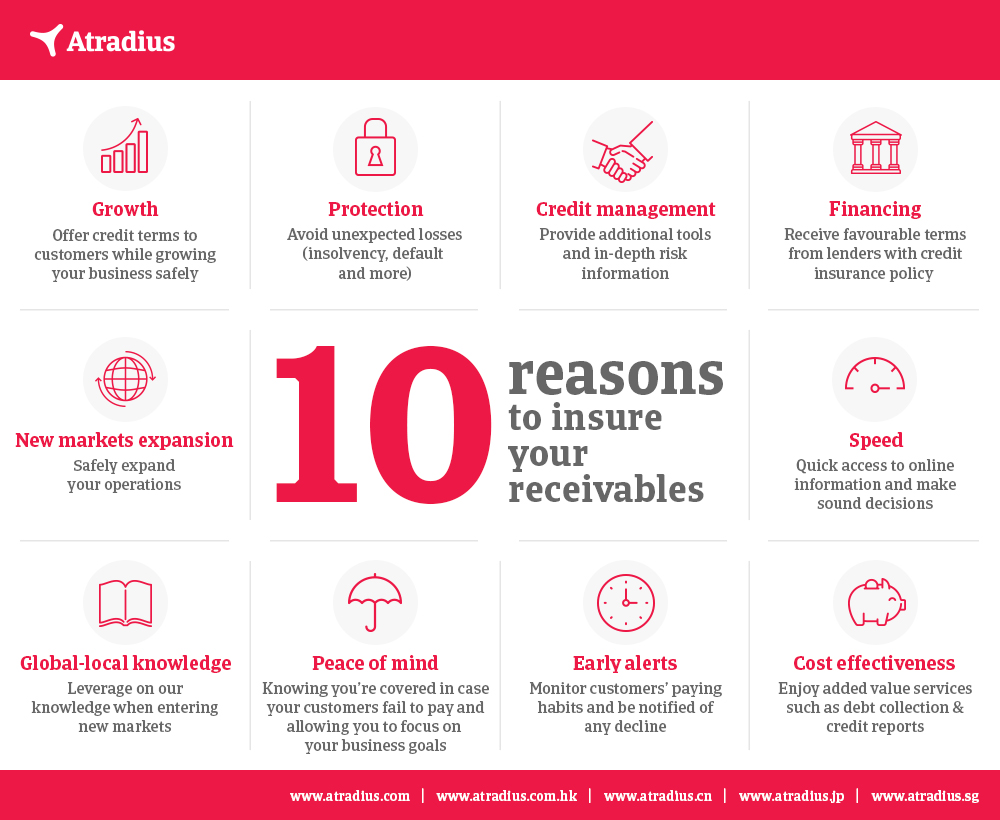Selling on credit is inherently risky. Every time you offer credit, you run the risk of late payments or even default, both of which can put pressure on your cash flow. A large single debt, or perhaps just an unlucky coincidence when several of your customers are late paying at the same time, could even threaten your business viability. Of course, you can avoid the risk by avoiding credit, simply ask your customers to pay up before you hand over your goods or services. But does demanding cash up front make good business sense? If your competitor is offering payment terms of 30 days, will your customer stay with you, or will they be lured by the offer of ‘free’ short-term finance?
There is also the question of trust. Trade is a two-way conversation that is built on trust. This may be an unfashionable point, scarcely raised in business school textbooks that prefer to explore EBITDA calculations, Days Sales Outstanding (DSO) formulae and profit and loss spreadsheets. However, in the marketplace, the simple reality is that your customer trusts you to deliver your products or services and you trust them to pay you. What’s more, unless you are a consumer buying something online, the normally accepted pattern is the seller hands over the item or completes a service and then the buyer pays for it. When you ask your customer to pay up before you deliver, what is the message you are sending? You are telling them: “I don’t trust you”.
Of course, there are always exceptions and some marketplaces have always operated on the basis of cash sales and will continue to do so. This is the norm and no non-verbal messages about trust can cloud the business relationships. However, if this is not your marketplace or perhaps you are looking at a new market, possibly abroad, what is the best way to build trade relationships where the trust transaction involves credit?
Credit insurance may be a perfect solution. For many businesses, in Vietnam and throughout the world, credit insurance is a key enabler of trade. This is not to detract from its ‘insurance’ function. It is, of course, designed to help you pick up the pieces when something goes wrong. However, this somewhat passive role, is only part of what credit insurance does. For some of the world’s leading businesses, from multinationals to smaller domestically focused companies, credit insurance forms part of the central sales strategy and ongoing customer relationship management. This is because businesses can afford to be less cautious when trading under the protective umbrella of credit insurance.

For example, if you know that your cash flow cannot risk invoices that are higher than VND3 billion for more than 60 days, that will be your credit limit. You will tell your customer that you cannot offer credit on sales above that limit and neither you, nor your customer, will have an opportunity to grow. However, if your credit insurer rates your customers highly and will underwrite transactions up to VND10 billion, you can afford to trade more with that customer. This, in turn, will lead to a stronger relationship with your customer and may be the driver of growth for both of your businesses.
What’s more, a positive rating by an international credit insurance company can act like a five-star review. When you take out credit insurance to secure trade with a customer, this can benefit their reputation and enhance their standing in the wider business community. This can be even more powerful than any positive review you could give. This is because you have a relationship with your customer, you are likely to say nice things about them in public to enhance your relationship. However, a credit insurance company is impartial. They do not have a relationship with your customer. If the credit insurer rates your customer as a good business that is safe to trade with, this statement will carry a lot of weight.
So, what of the reality of trade in the current climate? Is there a need for businesses to be more alert to credit risk, especially as Vietnam’s economy appears to be doing so well? It is true that Vietnam has been doing well. It is one of just a few countries in the world to avoid economic contraction last year. In fact, H1 has seen excellent growth with a GDP year-on-year increase of 6.6% and industrial production growing by 9.3%. Exports grew by an impressive 28% on the back of strong demand for electronics and clothing from China, the US and the EU.
However, the primary downside risk casting a cloud over this otherwise bright picture of successful trade is the pandemic. Up until H2 of 2021, Vietnam has been successful at containing the virus and this helped sustain trade and the economy. As indicated in the recent Atradius report, Covid vaccinations key to Vietnam GDP growth: “A marked acceleration of vaccine rollout in the coming months is key to sustain the envisaged robust growth rates.” This is happening and the growing vaccination rate has helped curb infection rates, which are falling again following a peak at the beginning of October. However, accelerating the vaccination programme further will help business confidence and trade.
What’s more, the downside risks posed by further virus outbreaks and further lockdown measures do not just apply to Vietnam. They apply to all of Vietnam’s markets and trading partners too. This is what we mean by the hidden risks of trade. You may be trading with a trusted customer with an excellent payment record and strong liquidity. However, through no fault of their own, they may find themselves in a situation where the local response to a new outbreak means they have to close. Or perhaps the goods they bought from you on credit are quarantined in a port meaning they can’t be sold on, and now your customer cannot afford to pay you. Or perhaps, your customer’s major buyer has been supported by their government’s fiscal policies for the past 18 months. When this was withdrawn, they went bust, causing a ripple-effect along the supply chain. You may have good insight into the strength of your customer, but do you have knowledge about their customers? How far along the supply chain can you see? That’s the additional value that you can expect from a credit insurer.
The next few months to a year or so will be a period of heightened risk for businesses throughout Vietnam and the world. Following the hiatus forced on many markets by the pandemic, many businesses will want to pick up trade and drive growth. However, further outbreaks of Covid-19 resulting in lockdowns or quarantines and the removal of government support leading to increased insolvencies both present real risks to trade. Businesses can best protect themselves from these risks, and enhance their customer relationships, with a trade credit insurance policy.
Written by: Hanh Vu, Country Manager, Atradius Information Services Vietnam Co. Ltd.About the author: Hanh Vu has extensive experience helping businesses identify domestic and export trade opportunities through active management of credit or trade receivable risks. With more than 15 years of experience in accounting, economic research and business development, Hanh currently heads up Atradius business in Vietnam.Atradius is a global provider of credit insurance, bond and surety, collections and information services, with a strategic presence in over 50 countries. In Vietnam, Atradius works with our official local partners BaoViet Insurance Cooperation and Tokio Marine Vietnam Insurance Co., LTD to provide customers with timely information about trade credit risks on companies in Vietnam. To learn more: https://atradius.sgFor enquiry: info.vn@atradius.comFollow us on LinkedIn: https://www.linkedin.com/company/atradiusasiaTo learn more about what is trade credit insurance, visit this page: https://baohiemtindungthuongmailagi.vn/









